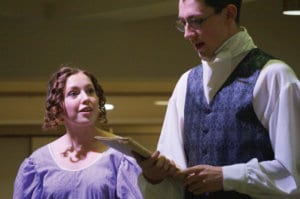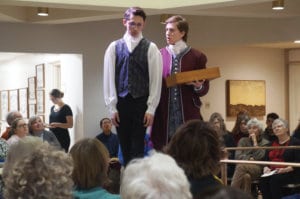Highlighting the lack of representation of women in art
This past weekend a collaborative project between the music and drama departments amplified the voice of a long silenced artist. Paradoxes: The Life and Music of Fanny Hensel explored the hard reality of women’s experiences in the arts by highlighting the strife and triumphs of censored German musician Fanny Mendelssohn Hensel.
Dually known as Fanny Hensel and Fanny Mendelssohn, her identity is often defined by her relationships to the men of her life. As the wife of Wilhelm Hensel she was known as the former, and as the sister of composer Felix Mendelssohn she was known as the latter. Despite outshining her brother in their early years of studies and displaying near-prodigious potential, Fanny lived her professional career in Felix’s shadow. In her youth, her father once wrote to her: “Music will perhaps become [Felix’s] profession, while for you it can and must be only an ornament.” Throughout her life, Fanny composed over 460 pieces of music, but due to the resistance she faced, only a small fraction of these were ever published – most of which under Felix’s name.
Paradoxes explores the resistance Fanny faced as she navigated the connections holding her back. Silenced by her stern father, her sheltering mother and her ambitious brother in the name of love and protection, Fanny experienced, for thirty years, 19th century societal standards about women’s professional abilities.
These interpersonal dynamics were depicted in short scenes performed by five actors. Between these, Fanny’s compositions were performed by vocal soloists, pianists, the Elliot Chorale and The Atlantic String Machine. As a multi-space, multi-media play, Paradoxes took place between the Brunton atrium and auditorium.

Initially inspired by her research work on Fanny, the project was spearheaded by Dr. Gayle Martin, musical director, with Dr. Glen Nichols as stage director and Jena McLean as the playwright and co-director. As an English and drama student who has shown a marked interest in playwriting, McLean stood out as the right person for the job, and was approached by Nichols to write the script. As a recipient of a JEA Crake Research Grant, McLean spent her summer researching and writing the project.
“I’ve been really lucky that the first play I’ve been working on as an actual playwright is not a normal play, not just one setting in a black box theatre,” McLean said. “I’m very interested in the kind of theatre that makes you move, makes you think, makes you question what theatre is and what we’re doing with it.”
McLean expressed gratitude that her work was able to explore the representation of the female voice in art. As an aspiring female artist herself, McLean lamented, “It’s terrifying but we see a lot of censorship and erasure today, and to see it happening in Fanny’s life, in ways it continues to happen today…is very jarring.”

Pianist Martine Jomphe echoed McLean’s sentiments. “It was really eye-opening to be a part of a show like this. It makes us realize how difficult it was for women to have their artwork validated,” Jomphe said.
Vocal soloist Morgan Reid said, “Paradoxes’ application of the female voice was wonderful with all female soloists, works by a female composer, a female lead choir and a female playwright highlighting a female character.” This collection of women in music and theatre at Mount Allison sharing Fanny Hensel’s story is certainly something that would have made her proud.





